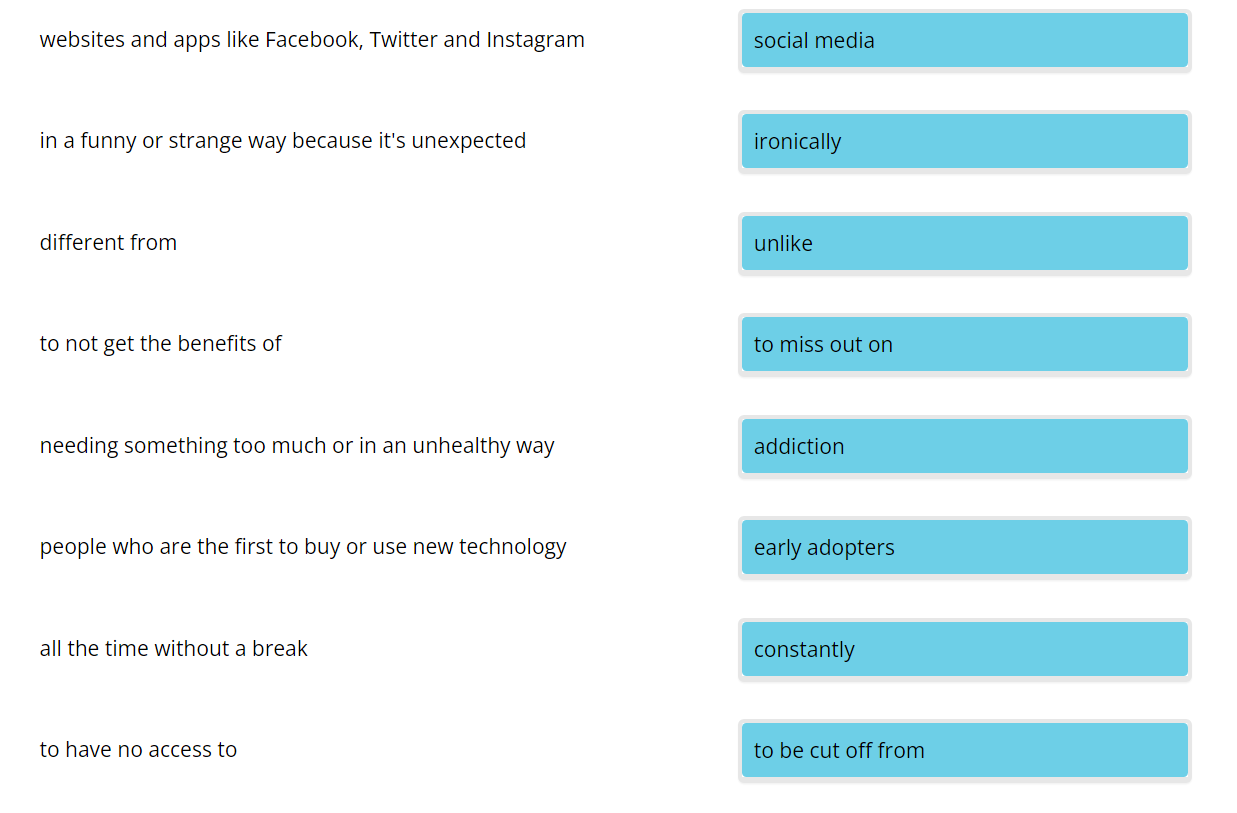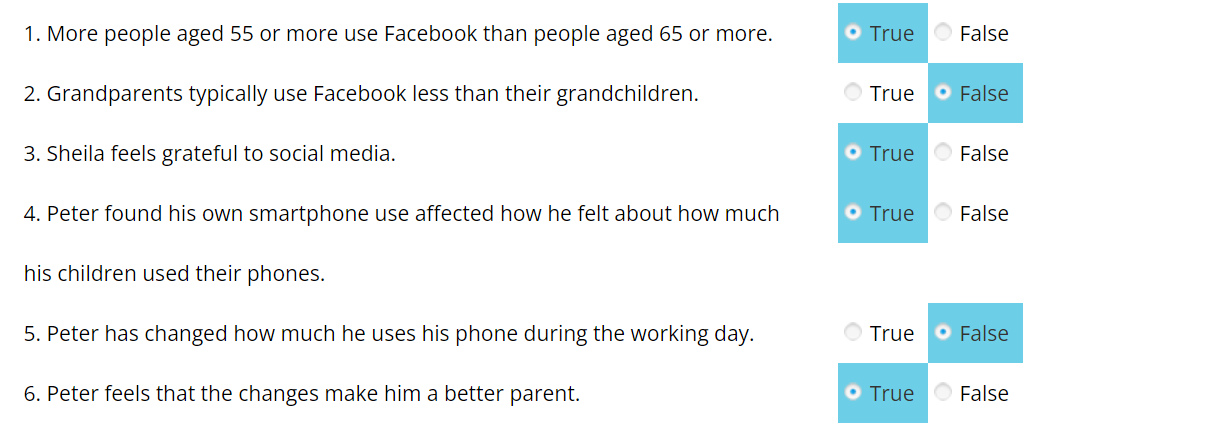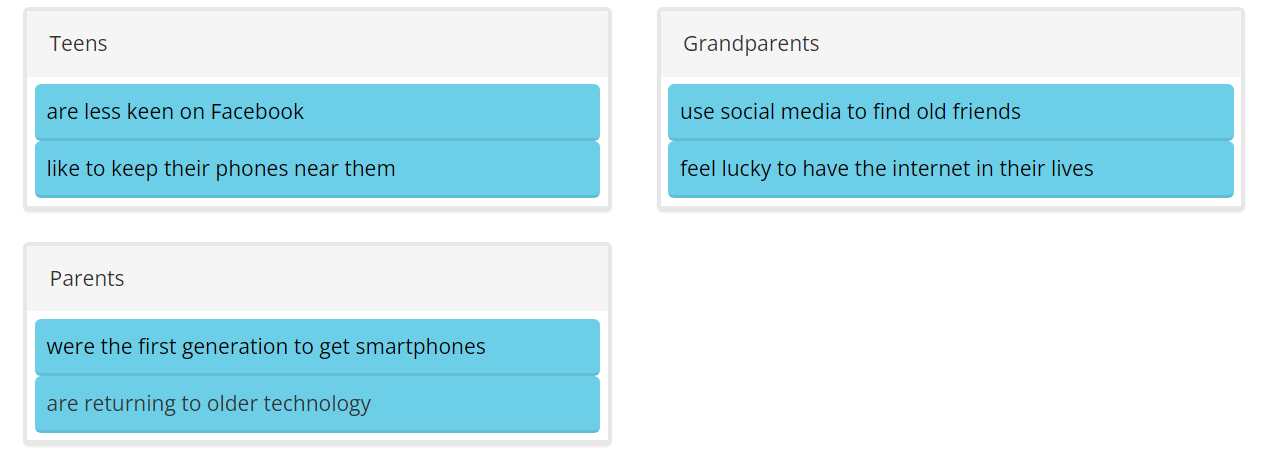【B1-Reading】05 Digital habits across generations-跨代人的数字习惯
【B1-Reading】05 Digital habits across generations-跨代人的数字习惯

Read an article about how people at different ages use computers and smartphones to practise and improve your reading skills.
阅读一篇有关不同年龄段的人如何使用电脑和智能手机练习和提高阅读技能的文章。
Do the preparation task first. Then read the text and do the exercises.
先做好准备工作。然后阅读课文并做练习。
Preparation-准备
Digital habits across generations – preparation
Match the words with their definitions.
- Question
Vocabulary
1.to miss out on
2.addiction
3.constantly
4.to be cut off from
5.unlike
6.social media
7.ironically
8.early adoptersDefinitions
a.websites and apps like Facebook, Twitter and Instagram
b.in a funny or strange way because it’s unexpected
c.different from
d.to not get the benefits of
e.needing something too much or in an unhealthy way
f.people who are the first to buy or use new technology
g.all the time without a break
h.to have no access to
- Answer
- websites and apps like Facebook, Twitter and Instagram
social media- in a funny or strange way because it’s unexpected
ironically- different from
unlike- to not get the benefits of
to miss out on- needing something too much or in an unhealthy way
addiction- people who are the first to buy or use new technology
early adopters- all the time without a break
constantly- to have no access to
to be cut off from

Reading text-阅读文字
English
Today’s grandparents are joining their grandchildren on social media, but the different generations’ online habits couldn’t be more different. In the UK the over-55s are joining Facebook in increasing numbers, meaning that they will soon be the site’s second biggest user group, with 3.5 million users aged 55–64 and 2.9 million over-65s.
Sheila, aged 59, says, ‘I joined to see what my grandchildren are doing, as my daughter posts videos and photos of them. It’s a much better way to see what they’re doing than waiting for letters and photos in the post. That’s how we did it when I was a child, but I think I’m lucky I get to see so much more of their lives than my grandparents did.’
Ironically, Sheila’s grandchildren are less likely to use Facebook themselves. Children under 17 in the UK are leaving the site – only 2.2 million users are under 17 – but they’re not going far from their smartphones. Chloe, aged 15, even sleeps with her phone. ‘It’s my alarm clock so I have to,’ she says. ‘I look at it before I go to sleep and as soon as I wake up.’
Unlike her grandmother’s generation, Chloe’s age group is spending so much time on their phones at home that they are missing out on spending time with their friends in real life. Sheila, on the other hand, has made contact with old friends from school she hasn’t heard from in forty years. ‘We use Facebook to arrange to meet all over the country,’ she says. ‘It’s changed my social life completely.’
Teenagers might have their parents to thank for their smartphone and social media addiction as their parents were the early adopters of the smartphone. Peter, 38 and father of two teenagers, reports that he used to be on his phone or laptop constantly. ‘I was always connected and I felt like I was always working,’ he says. ‘How could I tell my kids to get off their phones if I was always in front of a screen myself?’ So, in the evenings and at weekends, he takes his SIM card out of his smartphone and puts it into an old-style mobile phone that can only make calls and send text messages. ‘I’m not completely cut off from the world in case of emergencies, but the important thing is I’m setting a better example to my kids and spending more quality time with them.’
Is it only a matter of time until the generation above and below Peter catches up with the new trend for a less digital life?
English-Chinese
Today’s grandparents are joining their grandchildren on social media, but the different generations’ online habits couldn’t be more different. In the UK the over-55s are joining Facebook in increasing numbers, meaning that they will soon be the site’s second biggest user group, with 3.5 million users aged 55–64 and 2.9 million over-65s.+
如今的祖父母和孙子们都在社交媒体上交流,但不同代人的上网习惯却截然不同。在英国,加入 Facebook 的 55 岁以上用户数量不断增加,这意味着他们很快将成为该网站的第二大用户群体,其中 55-64 岁的用户为 350 万,65 岁以上的用户为 290 万。Sheila, aged 59, says, ‘I joined to see what my grandchildren are doing, as my daughter posts videos and photos of them. It’s a much better way to see what they’re doing than waiting for letters and photos in the post. That’s how we did it when I was a child, but I think I’m lucky I get to see so much more of their lives than my grandparents did.’
59 岁的希拉说:“我加入是为了看看我的孙子们在做什么,我的女儿则发布了他们的视频和照片。与等待邮件中的信件和照片相比,这是了解他们在做什么的更好方法。当我还是个孩子的时候,我们就是这么做的,但我想我很幸运,我比我的祖父母看到了更多的他们的生活。Ironically, Sheila’s grandchildren are less likely to use Facebook themselves. Children under 17 in the UK are leaving the site – only 2.2 million users are under 17 – but they’re not going far from their smartphones. Chloe, aged 15, even sleeps with her phone. ‘It’s my alarm clock so I have to,’ she says. ‘I look at it before I go to sleep and as soon as I wake up.’
讽刺的是,希拉的孙子们自己使用 Facebook 的可能性较小。英国 17 岁以下的儿童正在离开该网站(只有 220 万用户未满 17 岁),但他们并没有远离智能手机。 15 岁的 Chloe 甚至睡觉时都带着手机。 “这是我的闹钟,所以我必须这样做,”她说。 “我在睡觉前和醒来后都会看它。”Unlike her grandmother’s generation, Chloe’s age group is spending so much time on their phones at home that they are missing out on spending time with their friends in real life. Sheila, on the other hand, has made contact with old friends from school she hasn’t heard from in forty years. ‘We use Facebook to arrange to meet all over the country,’ she says. ‘It’s changed my social life completely.’
与她祖母那一代人不同,克洛伊这个年龄段的人在家里花太多时间在手机上,以至于错过了在现实生活中与朋友共度时光的机会。另一方面,希拉与四十年来没有音讯的学校老朋友取得了联系。 “我们使用 Facebook 安排全国各地的见面会,”她说。 “它彻底改变了我的社交生活。”Teenagers might have their parents to thank for their smartphone and social media addiction as their parents were the early adopters of the smartphone. Peter, 38 and father of two teenagers, reports that he used to be on his phone or laptop constantly. ‘I was always connected and I felt like I was always working,’ he says. ‘How could I tell my kids to get off their phones if I was always in front of a screen myself?’ So, in the evenings and at weekends, he takes his SIM card out of his smartphone and puts it into an old-style mobile phone that can only make calls and send text messages. ‘I’m not completely cut off from the world in case of emergencies, but the important thing is I’m setting a better example to my kids and spending more quality time with them.’
青少年对智能手机和社交媒体的沉迷可能要感谢他们的父母,因为他们的父母是智能手机的早期采用者。 38 岁的彼得是两个青少年的父亲,他说他过去经常使用手机或笔记本电脑。 “我始终保持在线状态,感觉自己一直在工作,”他说。 “如果我自己总是站在屏幕前,我怎么能告诉我的孩子们放下手机呢?”于是,晚上和周末,他就把SIM卡从智能手机上拿出来,装进只能打电话和发短信的老式手机里。 “在紧急情况下,我并没有完全与世界隔绝,但重要的是我为我的孩子们树立了更好的榜样,并与他们共度了更多美好时光。”Is it only a matter of time until the generation above and below Peter catches up with the new trend for a less digital life?
彼得的上一代人和下一代人赶上数字化生活新趋势只是时间问题吗?
Task 1-任务1
Digital habits across generations – 1
Are the sentences true or false?
- Question
- More people aged 55 or more use Facebook than people aged 65 or more.
True
False- Grandparents typically use Facebook less than their grandchildren.
True
False- Sheila feels grateful to social media.
True
False- Peter found his own smartphone use affected how he felt about how much his children used their phones.
True
False- Peter has changed how much he uses his phone during the working day.
True
False- Peter feels that the changes make him a better parent.
True
False
- Answer
- More people aged 55 or more use Facebook than people aged 65 or more.
✔True
False- Grandparents typically use Facebook less than their grandchildren.
True
✔False- Sheila feels grateful to social media.
✔True
False- Peter found his own smartphone use affected how he felt about how much his children used their phones.
✔True
False- Peter has changed how much he uses his phone during the working day.
True
✔False- Peter feels that the changes make him a better parent.
✔True
False

Task 2-任务2
Digital habits across generations – 2
Put the phrases in the correct group.
- Question
are returning to older technology
are less keen on Facebook
like to keep their phones near
use social media to find old friends
were the first generation to get smartphones
feel lucky to have the internet in their lives
Teens
Grandparents
Parents
- Answer
Teens
are less keen on Facebook
like to keep their phones nearGrandparents
use social media to find old friends
feel lucky to have the internet in their livesParents
were the first generation to get smartphones
are returning to older technology

Discussion-讨论
Who uses their phone the most among your family or friends?
您的家人或朋友中谁最常使用手机?
Vocabulary
ironically-讽刺地
- 简易
英/aɪˈrɒnɪkli/美/aɪˈrɑːnɪkli/
adv.具有讽刺意味的是;反讽地,讽刺地CET4 | CET6 | IELTS | GRE
- 《柯林斯英汉双解大词典》
ironically/aɪˈrɒnɪkəlɪ/|CET6+
ADV You use ironically to draw attention to a situation that is odd or amusing because it involves a contrast. 具有讽刺意味的是
• Ironically, for a man who hated war, he would have made a superb war cameraman.
具有讽刺意味的是,他这样一个憎恨战争的人曾经可能成为一名优秀的战地摄影师。ADV If you say something ironically, you say the opposite of what you really mean, as a joke. 讽刺地
• Classmates at West Point had ironically dubbed him Beauty.
西点军校的同学们曾经讽刺地给他起了一个绰号——“美人”。
unlike
- 简易
英/ˌʌnˈlaɪk/美/ˌʌnˈlaɪk/
prep.不像,和……不同;不是……的个性(或特点);(用于对比)与……不同adj.不同的,不相似的
v.取消点赞;以厌恶或敌意看待,不喜欢(be unliked)
conj.不同于
高中 | 考研
- 《柯林斯英汉双解大词典》
unlike/ʌnˈlaɪk/|CET4 TEM4
PREP If one thing is unlike another thing, the two things have different qualities or characteristics from each other. 不像
• This was a foreign country, so unlike San Jose.
这是异国,因而不像圣何塞。PREP You can use unlike to contrast two people, things, or situations, and show how they are different. 和…不同
• Unlike aerobics, walking entails no expensive fees for classes or clubs.
不像有氧运动,散步不需要昂贵的课时费或俱乐部费。PREP If you describe something that a particular person has done as being unlike them, you mean that you are surprised by it because it is not typical of their character or normal behaviour. 不像是…
• It was so unlike him to say something like that, with such intensity, that I was astonished.
那样激烈地说那样的话真不像是他,以至我很惊讶。
adopter
- 简易
英/əˈdɒptə(r)/美/əˈdɑːptər/
n.养父母;(新技术)应用者;接受管复数adopters
- 《柯林斯英汉双解大词典》
adop·ter n. /əˈdɒptə(r)/
1.a person who adopts a child收养者
2.a person who starts using a new technology(新技术)采用者
•early/late adopters of DVD players早期╱后来用DVD机的人以上来源于: 牛津词典
Early adopter buyers tend to be picky consumers.
早期的购买者倾向于是吹毛求疵的消费者。
addiction-入迷
- 简易
英/əˈdɪkʃ(ə)n/美/əˈdɪkʃ(ə)n/
n.瘾;入迷,嗜好CET4 | CET6 | IELTS
复数addictions
- 《柯林斯英汉双解大词典》
addiction/əˈdɪkʃən/|TEM4
N-VAR Addiction is the condition of taking harmful drugs and being unable to stop taking them. (毒品) 瘾
• She helped him fight his drug addiction.
她帮助了他对抗自己的毒瘾。N-VAR An addiction to something is a very strong desire or need for it. 瘾
• He needed money to feed his addiction to gambling.
他需要钱来满足他的赌瘾。
emergency-紧急事件
- 简易
美/ɪˈmɜːrdʒənsi/
n.紧急事件;紧急需要;突发事件,紧急情况;急症病人,急诊病人;<美>(医院的)急诊室adj.紧急情况下的;应急的
高中 | CET4 | CET6 | 考研 | IELTS | GRE | GMAT | SAT | 商务英语
- 《柯林斯英汉双解大词典》
emergency/ɪˈmɜːdʒənsɪ/|CET4
N-COUNT An emergency is an unexpected and difficult or dangerous situation, especially an accident, that happens suddenly and that requires quick action to deal with it. 突发事件; 紧急情况
• He deals with emergencies promptly.
他迅速地应对突发事件。ADJ An emergency action is one that is done or arranged quickly and not in the normal way, because an emergency has occurred. 紧急的
• Yesterday, the centre’s board held an emergency meeting.
昨天,中心的董事会召开了一次紧急会议。ADJ Emergency equipment or supplies are those intended for use in an emergency. 应急的
• The plane is carrying emergency supplies for refugees.
这架飞机载着给难民的应急物资。